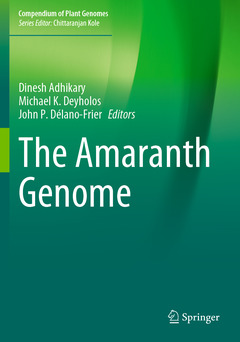The Amaranth Genome, 1st ed. 2021 Compendium of Plant Genomes Series

This book describes the development of genetic resources in amaranths, with a major focus on genomics, reverse, and forward genetics tools and strategies that have been developed for crop improvement. Amaranth is an ancient crop native to the New World. Interest in amaranths is being renewed, due to their adaptability, stress tolerance, and nutritional value. There are about 65 species in the genus, including Amaranthus caudatus L., A. cruentus L., and A. hypochondriacus L., which are primarily grown as protein-rich grains or pseudocereals. The genus also includes major noxious weeds (e.g., A. palmeri). The amaranths are within the Caryophyllales order and thus many species (e.g., A. tricolor) produce red (betacyanin) or yellow (betaxanthin) betalain pigments, which are chemically distinct from the anthocyanins responsible for red pigmentation in other plants. A. hypochondriacus, which shows disomic inheritance (2n = 32; n= 466 Mb), has been sequenced and annotated with 23,059 protein-coding genes. Additional members of the genus are now also been sequenced including weedy amaranths, other grain amaranths, and their putative progenitors.
Dr. Dinesh Adhikary holds a Ph.D. in Biology from the University of British Columbia, a M.S. in Plant Biology from Stephen F. Austin State University, and a B.S. in Genetics and Biotechnology from Brigham Young University, Utah. Dr. Adhikary's doctoral work focused on the development of genetic resources and functional analysis of betalains in amaranths. He developed the first major catalog of amaranth genes by assembling transcriptomes of A. hypochondriacus cv. Plainsman. He established the reverse genetics tool for amaranths, using virus-induced gene silencing (VIGS) and characterized the betalain biosynthesis pathway in A. tricolor. Additionally, he has contributed to morphologic and taxonomic analysis of the weedy and cultivated Amaranthus hybridus species complex.
Dr. Michael Deyholos holds a B.Sc. in Genetics from the University of Alberta, and a Ph.D. in Plant Molecular Biology from McGill University. His doctoral dissertation focused on the developmental genetics of the plant vascular system. Subsequently, he completed postdoctoral studies on abiotic stress genomics at the University of Arizona. Following 12 years as a faculty member of the Department of Biological Sciences at the University of Alberta, he moved to the University of British Columbia, where he is currently Professor and Head of Biology. He has continued his use of whole genome sequencing, transcriptome, and proteome analysis to study relationships between the cell wall, pathogens, and small metabolites in plants. His laboratory was a major contributor to the sequencing and annotation of the genomes of flax, amaranth, and other vascular plants. He was also a major contributor to the One Thousands Plants project.
Dr. John Délano-Frier got his B.Sc. in Food Biochemistry and Engineering at the Instituto Tecnológico y de Estudios Superiors de Monterrey, in Mexico, his M.Sc. i
Is the first book compiling advances in amaranth genome research
Written by experts in amaranth breeding, genetics, genomics, and transcriptomics
Provides comprehensive information on the amaranth genomics research until this point
Date de parution : 06-2022
Ouvrage de 181 p.
17.8x25.4 cm
Disponible chez l'éditeur (délai d'approvisionnement : 15 jours).
Prix indicatif 189,89 €
Ajouter au panierDate de parution : 06-2021
Ouvrage de 181 p.
17.8x25.4 cm
Thèmes de The Amaranth Genome :
Mots-clés :
Genome; Transcriptome; Molecular Breeding; Reverse Genetic; Sequencing
Ces ouvrages sont susceptibles de vous intéresser

The Wild Oryza Genomes 179,34 €


